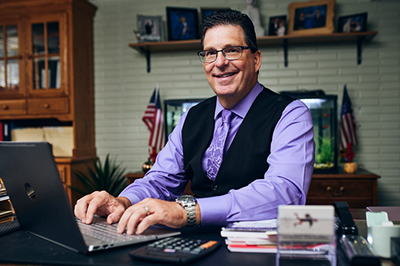
Scott Blaney spent the past two years refurbishing a boat that its previous owner had dubbed a $500 hunk of junk. Blaney, though, has a knack for seeing the possibility in things—and in people. It’s a quality he brings to work as an assistant vice president and manager of the Truist main branch in Martinsburg, West Virginia. That’s where he was when he first met with Rashida Yost, a local day care owner with a seemingly hopeless credit score and a completely unshakable desire to expand her business anyway.
When he first met Yost, he was taken by surprise. She wasn’t your typical business owner. She was a force of nature. “She’s driven. She’s focused. She’s relentless. She will not have ‘no’ as an answer,” he says. “I respect that. And I’m inspired by it.”
Born to care
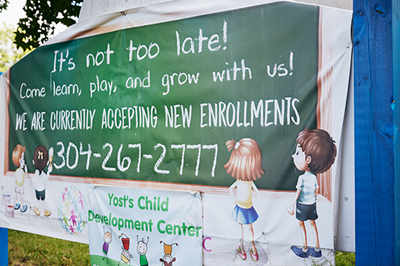
You might say caring for kids is in Yost’s DNA. “I always wanted to be a teacher. As a little girl, I would take my mom’s phone book and mark it with red pens: ‘Correct! Correct!’” she says. “My mom would go livid and ask, ‘Why would you mess up my phone book?’ and I would tell her ‘Because I was checking my kids’ work!’” Yost started in the child care industry at the age of 19 and spent the next 31 years pursuing her passion.
So, in 2019, when she told her husband, Paul, over dinner, “Honey, I bought a day care. Pass the salad!” it was not exactly a surprise. She explained the center where she worked was about to close after a previous sale had fallen through. “I thought, ‘Oh, no! Where will all these children go?’” says Yost, who still gets choked up about it more than a year later. “I had to buy it!”
Honey, I bought a day care. Pass the salad!"
Unfortunately, while her heart was in the right place, her finances weren’t. Her husband told her, “You take care of the kids. I’ll take care of the bills.” But they had one child still at home and a mortgage to pay. They didn’t have the time or equity to secure a loan, but Yost was determined to move forward. “I’m like Noah,” she says. “I figured God brought me here, and He was going to give me what I need.” So, she tapped into her family’s finances and signed the papers.
For a few months, it was smooth sailing for Yost Child Development Center. Then one day the world went into lockdown.
Open-door policy
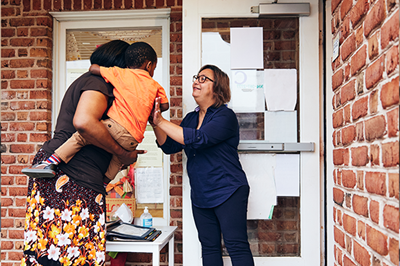
By April 2020, the U.S. was reporting the shutdown of 60% of child care programs across the country.1 But Yost was adamant her center would not be among them. For parents like Mickey Dunkley, who is a nurse, Yost’s decision was a lifesaver. “I work with cancer patients, which was even more stressful last year,” she says, “but thanks to Miss Rashida, I didn’t have to worry about my kids when I was at work, and that was a huge blessing.”
Still, Yost wanted to do more. Even before the COVID-19 pandemic, West Virginia had been a day care desert there were more than three times as many children as spots available in licensed child care settings.2 The Paycheck Protection Program had helped Yost shuffle funds, refinish the basement, and take in 20 more children by summer. But a master plan was forming in her mind: to open three more centers in Martinsburg by the end of 2021.
“When I put in a loan application at my bank, of course they didn’t give me anything,” she says now, with a laugh. It wasn’t funny at the time, but she put on a smile for the kids and waited for the rainbow she was sure would appear.
Answering his calling
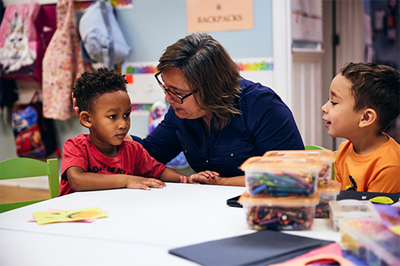
A few miles away, at a different bank, Blaney just happened to be dialing Yost’s number. It was a Thursday, which is when he routinely holds a “calling hour” to reach out to local business owners who might be in need of some help. That day, he’d gotten a little creative, setting aside his premade list and sifting through the day’s check deposits in search of new prospects. Yost’s paperwork happened to be in the right place at the right time.
The same could be said for Blaney, who says it was nothing short of remarkable that he was working in a bank in West Virginia to begin with. After high school, he’d joined the Marines to earn money for college, fought in Desert Storm, and then moved to Philadelphia to pursue two degrees, one in business and another in art and photography. “When I was young, I never would have thought in a million years I’d become a banker,” he says. “But I’m a banker at heart because I want to help people. There were times in my life when I needed help, and if I can pay it forward, that’s what I’m going to do.”
“I’m a banker at heart because I want to help people.
When Blaney invited Yost in, she bubbled over with enthusiasm as she shared her dreams. He quickly shifted from invigorated to devastated when he couldn’t get her approved for even a small-business credit card. “I went home, and it was just eating at me. I wanted to help this woman,” he says. She hadn’t given up on the kids, and he didn’t want to give up on her. “Then I had an epiphany,” he says.
Keeping the lights on
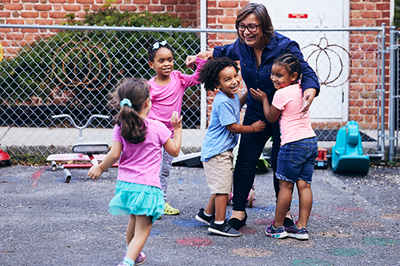
That night, Blaney remembered a recent talk by a Truist teammate about the bank’s partnership with a program now known as Partner Community Capital.3 Its purpose is to provide funding to small businesses that can’t secure a traditional loan. The next morning, Blaney reached out to a representative at the fund, who was so inspired by both Blaney and Yost that he reviewed her application while he was on vacation.
A short time later, Yost was approved for a $90,000 loan, which has helped her to reset her finances and realize her dreams. Her three new centers are opening in November and December, enabling her to care for 67 children, and she has a waiting list as long as her arm.
Yost’s determination and drive have inspired others, too. “Rashida is a visionary,” says Maryann Obot, who is launching her own small business in online retail. It’s something Obot works on while her older daughter is at Yost’s day care. “Rashida’s not really after the money. Yes, the money comes, but she’s really caring, not only for the kids but also for the families. She’s opening more day care centers, which helps society. The community.”
“Rashida’s really caring, not only for the kids but also for the families.
Start with care, end with joy

Blaney has always found it easy to see the magnitude of Yost’s work and how her caring has taken off, passing from one person to another, child to child and adult to adult. But he didn’t really think about his own part in the chain until Yost’s class presented him with an original piece of artwork: a canvas covered with their little handprints and the words “thank you.” It’s hanging in his office at the bank, and it tugs at his heartstrings whenever he looks at it.
“We’re all in the same boat,” says Blaney. “Everybody has a story. Everybody has a life event that’s going on. Everybody needs help from time to time. I want to tell everyone I meet, ‘I might not be able to help you, but tell me more about it, and let me try.’ The best time to be more caring is today. Don’t let it fall by the wayside.”
1 “Nationwide Survey: Child Care in the Time of Coronavirus,” Bipartisan Policy Center, April 2020.
2 “West Virginia’s Already Limited Child Care Capacity is at Risk,” West Virginia Center on Budget and Policy, June 2020.
3 “Truist Commits $2 Million to Support Small Businesses Affected by the COVID-19 Pandemic,” Truist.com, March 2020.
